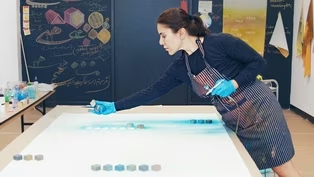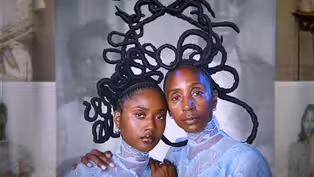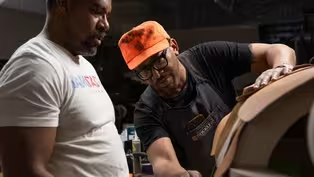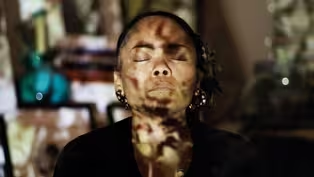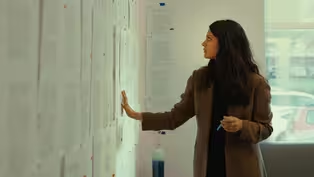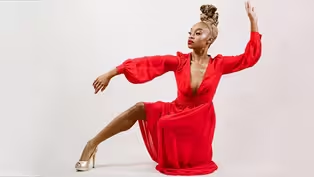
Edel Rodriguez: Freedom is a Verb
Special | 17m 14sVideo has Closed Captions
Discover this portrait of the Cuban-American graphic artist and graphic novelist Edel Rodriguez.
Discover this portrait of the Cuban-American graphic artist and graphic novelist Edel Rodriguez, which offers a vivid exploration of his journey from his early life in Cuba to acclaim in the United States. This visual and immersive documentary intimately connects the viewer with Rodriguez’s iconic artwork and the relentless pursuit of freedom that defines his life and work.
Problems playing video? | Closed Captioning Feedback
Problems playing video? | Closed Captioning Feedback
Support for American Masters is provided by the Corporation for Public Broadcasting, AARP, Rosalind P. Walter Foundation, Judith and Burton Resnick, Blanche and Hayward Cirker Charitable Lead Annuity Trust, Koo...

Edel Rodriguez: Freedom is a Verb
Special | 17m 14sVideo has Closed Captions
Discover this portrait of the Cuban-American graphic artist and graphic novelist Edel Rodriguez, which offers a vivid exploration of his journey from his early life in Cuba to acclaim in the United States. This visual and immersive documentary intimately connects the viewer with Rodriguez’s iconic artwork and the relentless pursuit of freedom that defines his life and work.
Problems playing video? | Closed Captioning Feedback
How to Watch American Masters
American Masters is available to stream on pbs.org and the free PBS App, available on iPhone, Apple TV, Android TV, Android smartphones, Amazon Fire TV, Amazon Fire Tablet, Roku, Samsung Smart TV, and Vizio.
Buy Now
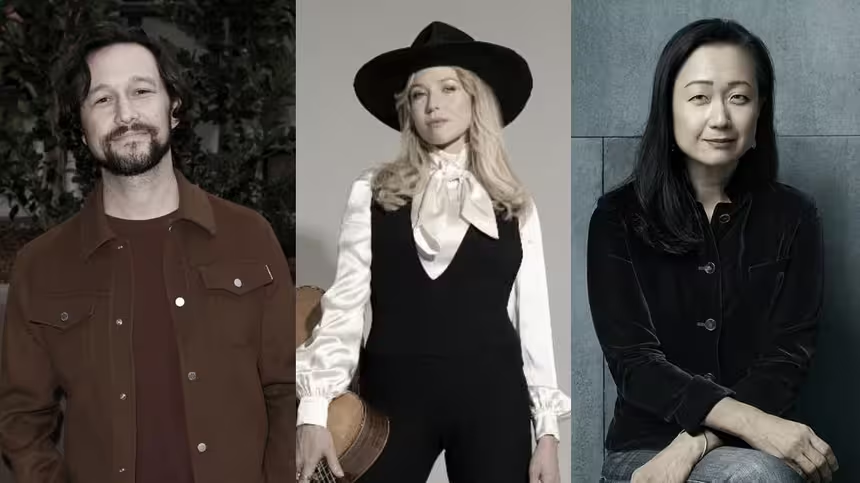
A front row seat to the creative process
How do today’s masters create their art? Each episode an artist reveals how they brought their creative work to life. Hear from artists across disciplines, like actor Joseph Gordon-Levitt, singer-songwriter Jewel, author Min Jin Lee, and more on our podcast "American Masters: Creative Spark."Providing Support for PBS.org
Learn Moreabout PBS online sponsorshipMore from This Collection
This documentary shorts series from American Masters and Firelight Media follows emerging cultural icons – creators who bring insight and originality to their craft – on their journeys to becoming masters of their artistic disciplines.
Maryam Taghavi: Estranged Letters
Video has Closed Captions
An Iranian-American artist’s work uses abstracted Persian calligraphy to signify migration. (15m 4s)
House of Aama: Threads of Legacy
Video has Closed Captions
Explore the creative process and familial narrative behind acclaimed fashion label House of Aama. (15m)
Norman Teague: Love Reigns Supreme
Video has Closed Captions
Follow furniture maker and conceptual artist Norman Teague as he prepares for a solo exhibition. (16m 23s)
Danielle Scott: Ancestral Call
Video has Closed Captions
Follow Danielle Scott as she makes art that explores the wretched pain and beauty of her ancestors. (15m 44s)
Gioncarlo Valentine: Exposures
Video has Closed Captions
Photographer Gioncarlo Valentine documents intimacy as a radical act of self-exploration. (18m 13s)
Sarah Thankam Mathews: After All This
Video has Closed Captions
Follow author Sarah Thankam Mathews as pressure mounts to follow up her acclaimed debut novel. (15m 38s)
Video has Closed Captions
Follow the Broadway choreographer as she elevates the possible with bold explorations of movement. (15m 25s)
Providing Support for PBS.org
Learn Moreabout PBS online sponsorship(gentle music) (water burbling) - As an artist with full freedom to do whatever I want, I don't have any pressure from any entity to behave, basically.
There's no threat to me that if I do a political piece here or something against the president, that I won't be able to continue working in this country.
It's something that I think about all the time.
It's very important to me because I've experienced it or my family has experienced it.
When you go through that, you then see all of life as sort of temporary.
You just think, this can disappear anytime.
So I'm very interested in documenting what has happened and what is happening in society.
I want people to look at my work in 30 or 40 years and go, "Well, that guy was taking a risk.
Why shouldn't I take a risk now?"
(people clapping) - [Host] Edel Rodriguez has created more than 200 magazine covers for the likes of "The New Yorker," "Time" magazine, "Newsweek," and "Der Spiegel."
He uses his own life to capture what it's like to grow up under an authoritarian government and to sound a caution for the future in the United States.
His book is called "Worm."
Edel, the floor is yours.
(people clapping) - Thank you.
It's strange to have kind of a whole book conceptualizing your mind for so many years.
I wanted to write a book that documents what happens to a Cuban family that doesn't agree with the system, and I wanted to tell the story of an immigrant family and why they leave their homeland.
(rooster crowing) (people chattering) (tense music) (soldiers yelling) Writing it was actually difficult because a lot of logistics and information and interviewing.
But once the whole thing was written, the fun part was seeing all these images come to life, remembering all of these things.
(soft music) (Edel speaks in foreign language) (Coralia speaks in foreign language) (Edel speaks in foreign language) (Coralia speaks in foreign language) (Coralia coughing) (Edel speaks in foreign language) (Coralia speaks in foreign language) - [Edel] Oh, wow!
(Coralia laughs) (Coralia speaks in foreign language) - Wow!
This is a different reaction than usual.
(Edel chuckles) (Coralia speaks in foreign language) (gentle music) - [Edel] The things I remember about my childhood in Cuba was growing up in the countryside.
El Gabriel, the town that I grew up in, was my world.
You know, I didn't really feel like I lived in Cuba.
I lived in El Gabriel.
(hooves thudding) My parents were probably the best people that I know.
They really tried to take care of not just us but of everyone.
There was always a fun time, there was always a party.
It always felt like we had enough.
They really did their best to give a good life to their kids, even under the situations that they were in.
(chicken clucking) (Edel speaking in foreign language) (Cesareo and Edel speaking in foreign language) (Cesareo speaking in foreign language) (camera clicking) (Cesareo continues speaking in foreign language) (soft music) (soldiers yelling) - I don't think people appreciate how much political decisions have a major effect on people's lives.
The way I explain, 'cause America has a really difficult way of understanding a system that is so different from this one, is just imagine that there's one company and that's who employs everybody.
And then you anger someone in that company that's important.
That's it.
You can't go to another company.
You were seen as a worm, someone that is living off the system, like underground, you know, eating off the system and not contributing or disliking or hating the system.
My parents, they didn't talk about Castro in a direct manner.
The situation was more about their concern of what was gonna happen to their kids, and they didn't like what the system was doing to us, the way we were being raised by the propaganda of the revolution.
So that combined with my father's entrepreneurial personality clashed with the Communist Party, and there were very specific threats that were made against him.
And that was the main reason why we left.
(waves crashing) (tense music) (helicopter blades whirring) - [Reporter] The Body Snatcher, an appropriate name for a rusted old shrimp boat jampacked with Cuban refugees.
It is part of what is believed to be the final exodus of boats from Mariel.
Officials say by tomorrow, the number of Cuban refugees brought over on the Mariel boatlift will total over 100,000.
(refugee speaks in foreign language) - [Reporter] In anticipation of the end of the boatlift, someone hand-lettered a sign over the immigration processing building on the docks at Truman Annex.
It says in Spanish, "Will the last person from Cuba please turn out the lights?"
(gentle music) (Cesareo speaks in foreign language) (people chattering) (Cesareo speaks in foreign language) (gentle music fades) - Colors in Cuba are color.
(chuckles) They are not values of color or gradations of color.
It is just straight-up color.
So turquoise next to a green and a red in between.
So I think that way.
And at times, it was an issue when I was in art school here in New York City where everybody was, (chuckles) you know, obsessed with shades of gray and maybe a mauve.
And here I come into it with a painting like a carnival of color.
And to me, it was normal.
I did my thesis at Hunter College on Cuban American artists, people like Los Carpinteros, Jose Bedia, and street art, just random paintings that were done on walls in my town.
So since I grew up in Cuba where this is just life, you kind of struggle a lot with this idea.
Well, do I do that to belong or do I stay with what I know?
(lighthearted music) Cuban artists deal with political issues all the time, whether subtly or overtly.
It's just part of life there.
From my experience, I know a dictator when I see one, and I don't like them.
That was one of the things that made me become much more politically involved in my work.
I've seen what can happen when the wrong people get into power, and I feel that artists are in a unique spot and have a responsibility to become involved in what's happening in the culture.
I've never been able to get Trump as a fried egg, you know, like he's done.
This would be in the middle.
So, you know, sometimes I would bring in some color in here.
You know, Trump's orange face in here, right?
His little weaselly mouth in the middle here.
You know, so I like to frame out the covers.
It makes it feel like a cover when you box it out.
You write, say, the "Time" logo on here.
I think comedy is a very important tool to kinda disarm people.
And then once you disarm them with a joke, maybe they're more open to your point of view.
So, a lot of my work is making fun of a situation by poking at it or joking.
And if someone else laughs along with you, then they're like, "Alright, you have a point."
I've had very right-wing people go, "I don't agree with you, but damn, that's really good."
(chuckles) And I think if you do that, you make people kind of slightly understand another point of view.
(lively music) (Jorge speaks in foreign language) (Edel speaks in foreign language) (Jorge speaks in foreign language) (Edel speaks in foreign language) (Jorge speaks in foreign language) - [Jorge] You made it.
(Jorge speaks in foreign language) (Edel speaks in foreign language) (Jorge speaks in foreign language) (Edel speaks in foreign language) (pensive music) - Part of the reason I wrote the book was to understand myself.
You can be a middle-class family in America or any other country and the political climate gets to a point where it's so stressful that you have to leave it.
You know, I can't imagine leaving my house right now, but could happen.
And I think, of course, these things get recorded in your memory.
It makes a mark on you.
It's very hard for me to even talk or write about my grandparents 'cause I break down.
(chuckles) But it is, you know, sitting on your grandmother's lap at night and she's telling you these stories that I still think about.
When they passed away, I couldn't go to Cuba to bury them.
Everything just happened in this other space that I couldn't access easily.
And you avoid it.
And then when you finally have to write about that, then you, like, break, you know, you kind of break down.
But now I realized it's important to keep a record of your life, to put it down so that you don't forget it.
I didn't want everything that happened to my family to be in vain.
It's like a bomb went off, like poof, and everyone went in so many different directions.
So that's why I made the book.
(Cesareo speaks in foreign language) (Coralia speaks in foreign language) (Edel speaks in foreign language) (Coralia speaks in foreign language) - [Coralia] Enjoy the trip.
(Coralia chuckles) Enjoy.
(lively music) - It's a great moment to be here with my little brother.
- (chuckles) I'm not so little.
- Not so little.
- I always see everyone in Cuba, even my friends.
Like, what if I didn't leave?
I would be in that situation.
So with those rights come responsibility to speak about things when I can.
There are a lot of people that question whether this is the greatest country in the world.
So every time I make something that is highly critical of the politics here, I don't just make it for this audience, I'm making it for people in Cuba that are watching what I'm doing and going, wow, I guess the U.S. is still a place where you can do these things.
That's very important to me, to show the world what you can do here.
But yeah, at the same time, as I'm doing it, I'm like, okay, I hope I still can.
(laughs) (lively music continues) (lively music continues) (clapperboard thuds) (pensive music)
Support for PBS provided by:
Support for American Masters is provided by the Corporation for Public Broadcasting, AARP, Rosalind P. Walter Foundation, Judith and Burton Resnick, Blanche and Hayward Cirker Charitable Lead Annuity Trust, Koo...

